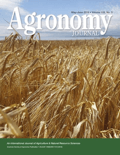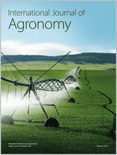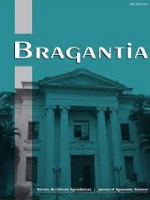
Revista de Agricultura Neotropical
Scope & Guideline
Transforming Challenges into Opportunities in Agriculture
Introduction
Aims and Scopes
- Sustainable Agriculture Practices:
Research that explores sustainable farming techniques, including organic practices, agroforestry, and integrated pest management, aimed at reducing environmental impact while maintaining productivity. - Soil Health and Management:
Studies focusing on soil chemistry, physical properties, and management practices that enhance soil health, fertility, and carbon sequestration in various agricultural systems. - Crop Production and Improvement:
Investigations into the agronomic performance of various crops under different conditions, including the evaluation of cultivars, fertilization strategies, and environmental stress factors. - Pest and Disease Management:
Research on biological control methods, pest resistance, and the impact of agricultural practices on pest populations and plant health. - Environmental Impact Assessment:
Assessment of the environmental effects of agricultural practices, including land use changes, agrochemical applications, and biodiversity conservation.
Trending and Emerging
- Climate Resilience in Agriculture:
There is an increasing focus on the impact of climate change on agricultural systems, including studies on drought resistance, soil moisture management, and the adaptation of crops to varying climatic conditions. - Use of Biostimulants and Organic Inputs:
Research on biostimulants and organic fertilizers is gaining popularity as farmers seek sustainable alternatives to enhance plant growth and soil health. - Technological Integration in Farming:
The application of technology such as precision agriculture, remote sensing, and data analytics in crop management is emerging as a significant trend, reflecting the modernization of agricultural practices. - Soil Microbial Dynamics:
An increasing number of studies are exploring the role of soil microorganisms in plant health, nutrient cycling, and soil fertility, emphasizing the importance of soil biology in sustainable agriculture. - Plant Genetics and Breeding Innovations:
There is a notable trend in research focused on genetic improvement and breeding techniques, including the use of CRISPR and other biotechnological approaches to enhance crop traits.
Declining or Waning
- Traditional Fertilization Practices:
Research focusing on conventional chemical fertilization methods is less prevalent as sustainable and organic alternatives gain traction among researchers and practitioners. - Single Crop Systems:
Studies centered around monoculture practices are diminishing as there is a growing emphasis on polycultures and agroecological practices that promote biodiversity and resilience. - Generalized Pest Control Methods:
Research on broad-spectrum chemical pest control is decreasing as integrated pest management (IPM) and biological control methods become more favored.
Similar Journals

Revista Brasileira de Ciencias Agrarias-Agraria
Exploring the frontiers of agricultural science and practice.Revista Brasileira de Ciencias Agrarias-Agraria is an esteemed academic journal published by the Universidade Federal Rural de Pernambuco, dedicated to advancing the field of agricultural and biological sciences. With a focus on disseminating high-quality research, this journal plays a pivotal role in fostering knowledge exchange within the agricultural community, particularly in Brazil and beyond. As a Q3 ranked publication in the Agricultural and Biological Sciences category, Revista Brasileira de Ciencias Agrarias-Agraria contributes to the growing body of literature by featuring insightful articles from both emerging and established researchers in the field. The journal has been consistently published since 2011 and is committed to open access principles, ensuring that research findings are accessible to a wide audience. Researchers, professionals, and students will find this journal an invaluable resource for deepening their understanding of current trends and innovations in agriculture.

Pesquisa Agropecuaria Tropical
Empowering innovation in agronomy and crop science.pesquisa Agropecuaria Tropical is a premier Open Access journal dedicated to advancing the knowledge and practices within the field of agronomy and crop science. Since its inception in 1971, this peer-reviewed journal, published by the Universidade Federal de Goiás, has played a pivotal role in disseminating high-quality research from Brazil and beyond. Operating under an Open Access model, it ensures that scholarly articles are freely accessible, thereby fostering greater collaboration and innovation. With a Scopus ranking placing it in the 32nd percentile among its peers in agricultural and biological sciences, and a current classification in the Q3 category of agronomy and crop science, the journal serves as an essential resource for researchers, professionals, and students alike. As it continues its publication journey from 2010 to 2024, it remains committed to contributing valuable insights and advancements in the agricultural sector, ultimately influencing sustainable practices and food security.

Ciencias Agronomicas
Innovating agronomy: Bridging research and practice.Ciencias Agronomicas is a prominent academic journal dedicated to the field of agricultural sciences, published by the Universidad Nacional de Rosario's Faculty of Agricultural Sciences in Argentina. This journal aims to foster innovative research and disseminate knowledge across various disciplines within agronomy, including crop production, soil health, pest management, and sustainable farming practices. Although it currently operates without an open access model, it plays a vital role in advancing agricultural research and contributing to global food security challenges. Through rigorous peer-review and the publication of high-quality articles, Ciencias Agronomicas serves as an essential resource for researchers, agronomists, and students seeking to stay informed about the latest developments and breakthroughs in the agronomic sciences. With its commitment to excellence and relevance, this journal stands as a critical platform for the dissemination of impactful research in agriculture.

AGRONOMY JOURNAL
Empowering Crop Science with Decades of InsightThe Agronomy Journal, published by Wiley, is a leading platform for cutting-edge research in the field of agronomy and crop science. Established in the United States, this prestigious journal carries the ISSN 0002-1962 and E-ISSN 1435-0645, with its coverage spanning from 1976 to 2024, showcasing a wealth of knowledge over decades. The journal is recognized in the top quartile (Q1) of its category, making it a highly respected source for quality literature, ranking #108 out of 406 in the Scopus database and reflecting a 73rd percentile standing in agricultural and biological sciences. While it operates under traditional access options, its commitment to disseminating valuable scientific inquiry aligns with the objectives of advancing sustainable agricultural practices globally. The Agronomy Journal serves as an indispensable resource for researchers, professionals, and students eager to stay abreast of significant advancements and discussions influencing the future of crop science and agronomic research.

Revista de Ciencias Agricolas
Harvesting Insights for Global AgricultureRevista de Ciencias Agricolas, published by UNIV NARINO, is a prominent open-access journal dedicated to advancing the field of agricultural sciences. Since its inception in 1969, this journal has been an invaluable resource for researchers, professionals, and students alike, focusing on a wide array of topics that include sustainable farming practices, agricultural technology, and rural development. With the ISSN 0120-0135 and the E-ISSN 2256-2273, the Revista de Ciencias Agricolas ensures broad accessibility to its research articles, facilitating a wider dissemination of knowledge within the agricultural community. Situated in San Juan Pasto, Nariño, Colombia, the journal is committed to providing high-quality content that addresses both local and global agricultural challenges, thereby contributing to the enhancement of food security and livelihoods across diverse populations. The journal's inclusive approach not only fosters academic discourse but also encourages innovative solutions within the agricultural sector, making it an essential platform for knowledge exchange in this vital area of study.

SPANISH JOURNAL OF AGRICULTURAL RESEARCH
Empowering Scholars to Transform Agricultural LandscapesThe Spanish Journal of Agricultural Research (ISSN: 1695-971X, E-ISSN: 2171-9292), published by the prestigious Consejo Superior Investigaciones Cientificas (CSIC), serves as a vital resource for those engaged in the fields of agronomy and crop science. Established as an Open Access journal since 2003, it aims to foster the dissemination of innovative research and practical applications related to agricultural practices and sustainability. With its Q3 category in Agronomy and Crop Science and a Scopus ranking of #224 out of 406, the journal provides an accessible platform for scholars to share valuable findings that enhance agricultural productivity and environmental stewardship. Covering research from 2006 to 2024, this journal continues to be instrumental for researchers, professionals, and students eager to remain at the forefront of agricultural science advancements.

International Journal of Agronomy
Empowering Agronomy Through Open Access InsightsIntroducing the International Journal of Agronomy, an influential publication in the field of agricultural sciences, established by HINDAWI LTD. With an impact factor that reflects its relevance and quality, this journal has been an essential resource for researchers and professionals since its shift to Open Access in 2009, facilitating widespread dissemination of knowledge. Based in the United States, the journal has achieved notable recognition within the academic community, currently ranked in the Q2 quartile among Agronomy and Crop Science, with an impressive Scopus Rank of #139 out of 406 in its category, representing the top 65th percentile. Spanning from 2013 to 2024, it aims to advance the understanding and innovation in agronomy through its rigorous peer-reviewed research articles, reviews, and case studies. With a commitment to enhancing global agricultural practices and sustainability, the International Journal of Agronomy stands as a vital platform for sharing cutting-edge findings that ultimately contribute to the advancement of the agronomic sciences.

BRAGANTIA
Fostering Sustainable Solutions Through ScienceBRAGANTIA, published by the Instituto Agronômico, is a distinguished open access journal that has been a vital resource since its inception in 1977. With an ISSN of 0006-8705 and E-ISSN 1678-4499, this journal is recognized for its contributions to the field of Agricultural and Biological Sciences, where it currently holds a respectable Q2 ranking as of 2023. Additionally, BRAGANTIA is indexed in various databases, supporting its impact within Materials Science (Q3 ranking). Positioned in Brazil, the journal promotes the dissemination of high-quality research, aiming to bridge the gap between academia and practical applications in agricultural innovation and sustainability. Researchers, professionals, and students looking to keep abreast of recent advancements and their implications will find BRAGANTIA to be an indispensable platform for sharing and accessing vital agricultural knowledge.

REVISTA DE LA FACULTAD DE CIENCIAS AGRARIAS
Exploring the Frontiers of Agronomy and Plant Science.REVISTA DE LA FACULTAD DE CIENCIAS AGRARIAS is an esteemed academic journal published by UNIV NACIONAL CUYO, FAC CIENCIAS AGRARIAS, located in Chacras de Coria, Mendoza, Argentina. As a pivotal publication in the fields of Agronomy and Plant Science, it has achieved a commendable Q2 ranking in both categories, indicating its relevance and impact within the scientific community. Since its establishment as an Open Access journal in 2007, it has facilitated the dissemination of crucial research, fostering collaboration and innovation among researchers, professionals, and students alike. The journal's converged years from 2008 to 2024 allow it to present contemporary advancements and discussions related to agricultural practices and plant sciences. With a strong commitment to quality and accessibility, REVISTA DE LA FACULTAD DE CIENCIAS AGRARIAS provides a valuable platform for those engaged in the crucial exploration of sustainable agricultural methodologies and plant innovations.

Bioagro
Pioneering research that cultivates knowledge and sustainability.Bioagro is an esteemed academic journal dedicated to advancing research in the field of Agricultural and Biological Sciences. Published by the University Centroccidental Lisandro Alvarado in Venezuela, this journal has made significant strides since its inception in 2008, with a focus on delivering high-quality research publications that address contemporary challenges in agriculture and biology. Recognized for its contributions, it holds a Q3 ranking in the Agricultural and Biological Sciences (miscellaneous) category as of 2023, and it ranks #125 out of 221 in its field, placing it in the 43rd percentile. Although it operates on an Open Access model, Bioagro strives to provide broad access to innovative research, thereby fostering collaboration and knowledge dissemination among researchers, professionals, and students. With a commitment to include a wide range of topics, the journal aims to be a pivotal platform for exploration and dialogue in agricultural sciences, ensuring that key findings reach both scientific and practitioner audiences. Located in Barquisimeto-Cabudare, Lara, Venezuela, Bioagro invites submissions that contribute to the global discourse on sustainable practices and innovations in agriculture.